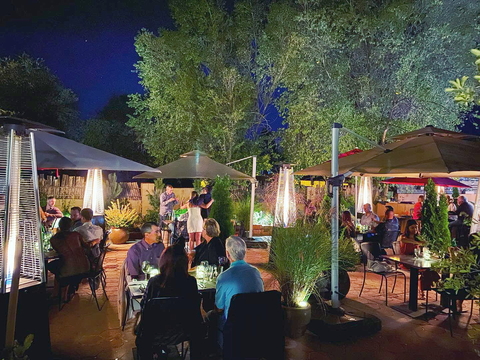By Michelle Fishburne, Who We Are Now
Planning and thinking ahead are essentials in the bar and restaurant business, where margins often are razor-thin. Staffing levels and inventory levels need to be just right, as too much or too little could spell trouble. But what about toilet paper inventories for the staff’s bathrooms at home? Not really something any restaurant owner has ever considered part of their planning, right? Until 2020.
When stores were stripped of their toilet paper supplies overnight, the staff of Washington, D.C.’s wildly popular Hook Hall found themselves in a bind. They were working while others were hoarding. Owner Anna Valero (a featured speaker at Bar & Restaurant’s Evolve series) heard her crew lamenting the fact they couldn’t find any toilet paper. “So we thought, well, we can still get toilet paper from our distributors. Why don't we just put together, you know, care kits for our crew?” explained Valero, “Then we started doing it for more than just our crew. That was the beginning of Hook Hall Helps.”
Aiding the Hospitality Industry
Things happened quickly. Aided by restaurants, customers, and partners throughout the city, within weeks Hook Hall Helps became a well-mechanized effort to supply goods, food and meals to any person in the hospitality and events industry who was in need. In partnership with the Restaurant Association of Metropolitan Washington, $750,000 was raised to help fund the effort.

Anna Valero of Hook Hall (Photo: Courtesy of Hook Hall)
Valero, ever the planner, kept one eye on what was needed in the moment and the other eye on what would be needed in the future. “To ensure there are jobs for people to go back to when this is all over, we started paying restaurants to make the meals we distributed daily,” she explained. “Then during the summer when restaurants reopened, Hook Hall Helps suspended daily distributions so it could save money for what was likely to be a hard winter.”
To survive the pandemic, Valero oversaw a transformation of her own business, Hook Hall. It opened in July 2019 as one of the city’s premier tavern and event spaces, with 7,000 square feet inside and 7,000 square feet outside. Yet to remain open during COVID-19, Valero added restaurant fare. To keep going during the winter, she has recreated Hook Hall into a Viking Village, complete with Viking huts and fire pits. Putting one foot in front of the other is the order of the day, Valero has no time to sit back and assess risks, if she is to outlast COVID.
Making It Through the Pandemic
Santa Fe, New Mexico’s oldest restaurant, El Farol, is a veteran when it comes to riding out pandemics. Opened in 1835, El Farol was already 83-years-old when the 1918 influenza pandemic hit. And with the steady, experienced hand of its current owner, Rich Freedman, El Farol is making it through COVID-19.

El Farol patio dining in Santa Fe, New Mexico (Photo: Courtesy of El Farol)
The patios, with water features, landscaping and glittering lights, have been a hit with the local community. Where Freedman struggles, though, is with the loss of his close-knit restaurant team. “You spend years developing a team and it's a lifestyle, you're around these people all the time and you can’t help but enjoy them,” he explained. “I have a fantastic group of people and I don't want to do business without them.”
Freedman has done his best with the ups and downs, closing indoor dining, expanding takeout, opening a patio for summer dining, restricting summer dining to 25 percent when cases spiked, then back to takeout when the cold of the New Mexico winter set in. He expects El Farol to open outside dining again in mid-March, when clocks spring forward.
“Yet it's very, very hard to plan in this environment,” said Freedman. “You can say, ‘Well, the weather's going to be nice, I'm going to have outdoor dining.’ But if our state is in the red category, we can only have 25 percent of capacity outside, which is not many tables. I’ve been a businessman for a long time, and I enjoy planning. There’s just no planning in this situation.”
“Here’s What’s Going to Happen in 2020…”
Christie Lowe thought she and her team had planned out everything they needed to consider when they opened Bobby Carl’s Table in Birmingham, Ala. in November 2019. They had not considered a pandemic. Lowe said, laughing, “‘If you had told the Christie of 15 years ago, ‘Here's what's going to happen in 2020: You're going to own a restaurant and a pandemic is going to happen,’ I would have said, ‘I'm out.’”
By the beginning of March 2020, her new staff of 13 employees had just come through their first few months, working out the kinks and bonding as a team. When restaurants were shut down and moved to curbside only, Lowe was caught flat-footed, as Bobby Carl’s had no real takeout business and no online ordering system. Lowe had to lay off all but one member of her staff. For months, it was just one cook and Lowe running all the orders each day.
“We are back to a staff of 13 again now, January 2021,” explained Lowe. “It's scary, though, because it's constantly a negotiation. You’ve got to have the folks here to be able to deliver the service that you are fighting hard to keep alive. You have to do it right, so you have to take the chance.”
Even for veterans of the restaurant business, predicting needed staffing levels has been incredibly hard during the pandemic. Victoria Fremont and Joe Schlarbaum, owners of Standish Cafe in Minneapolis, Minnesota, have been in the restaurant business since their teenage years and they say they’ve never seen such an unpredictable year.
“We used to always think we could predict our business based on weather and time of year, and events and things like that,” said Fremont. “What we learned on Mother’s Day 2020 is that we're not predicting anything during this pandemic.”
Schlarbaum added, “Mother's Day was probably in the top five of my worst days ever in the restaurant business. We went from serving 30 people three days before then, to serving 300 people that day.” Of course, not only was inventory an issue, but Standish Café’s staffing was still very low because of the shut down – just Schlarbaum in the kitchen, Fremont up front and one other person.
“That uncertainty, that inability to predict, is still true to this day, here in January 2021,” said Fremont. “Some days when we think we're going to be busy, we're dead, and some days when we think we're going to be dead, we're busy. We have learned that you just don't know.”
“So, there has to be some middle ground preparedness,” concluded Schlarbaum, “There has to be some middle ground because a big day could be any day.”
Once in a Century
The wild and crazy roller-coaster ride restaurants have been on since the pandemic struck cannot be overstated. Yet El Farol’s Freedman does a good job of summing it up with his deadpan humor, “A once a century pandemic was not one of the risk factors I considered when I got into the business.” Once in a century. Let’s keep it that way.
Michelle Fishburne has been traveling throughout the United States in her RV, collecting contemporaneous oral histories of how Americans are facing the challenges presented by the pandemic. As of Jan. 1, 2021, she had interviewed more than 150 people across 28 states. Her project, Who We Are Now, can be found at: WhoWeAreNow.us.
To read more of Bar & Restaurant’s “Pivoting” reports, click below:
- Pivoting in Nashville
- Pivoting in North Carolina, Delaware & New Mexico
- Pivoting in Philly
- Pivoting: 10 Months into the Pandemic, Some Restaurants and Bars Feel Grateful
Join Bar & Restaurant at Evolve
To get more insights from industry leaders, join Bar & Restaurant’s Evolve. The program is a free, six-month virtual event series to help keep bar and restaurant owners, operators, investors and suppliers engaged with sales and marketing programs, skills development, staff retention tools and networking opportunities. To learn more and register to attend Evolve as an operator for free, click here. All virtual event air dates will be available to relive on demand, once registered.
